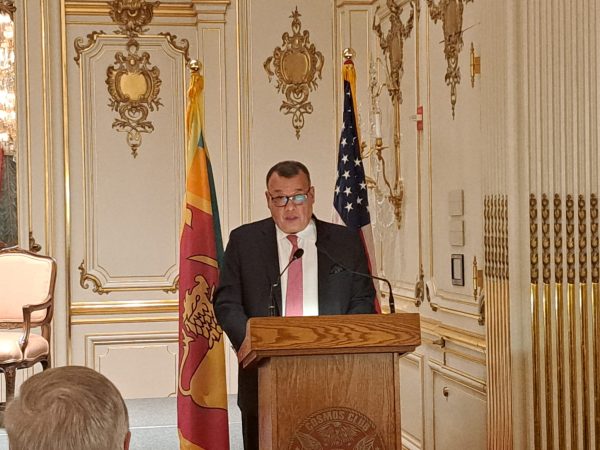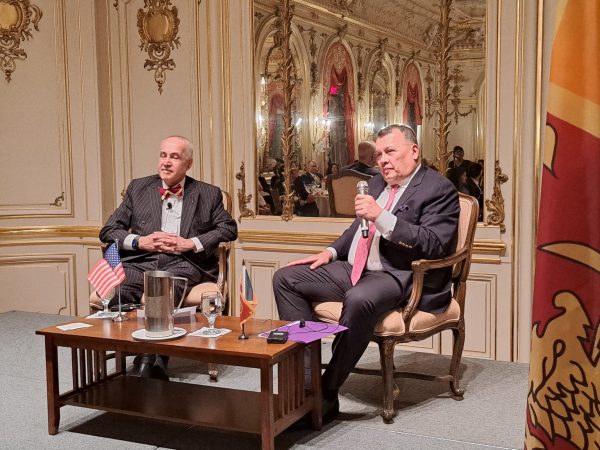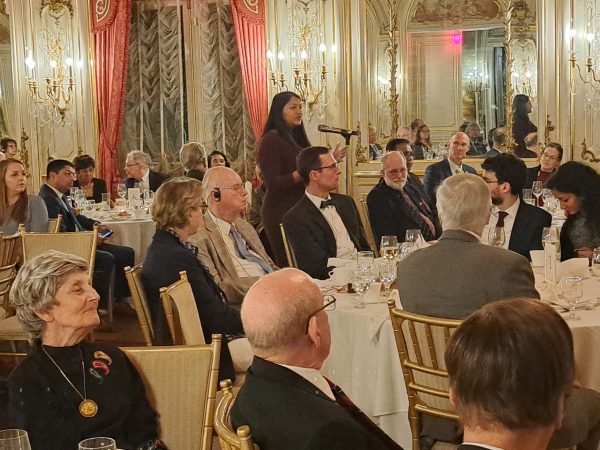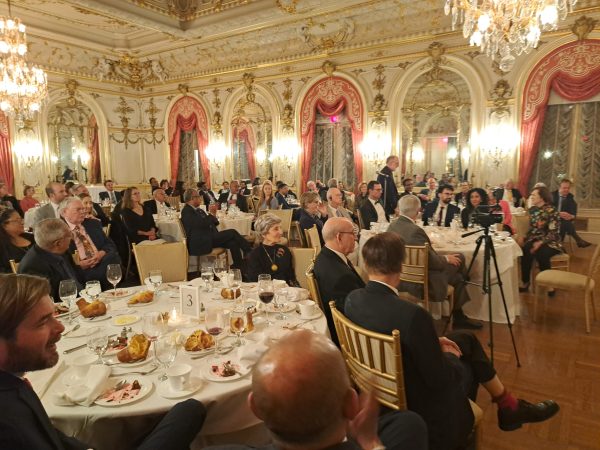
Ambassador Mahinda Samarasinghe delivered an address entitled "Sri Lanka - United States Relations: Celebrating 75 of partnership" at the prestigious Cosmos Club in Washington D.C. on 06 March 2023.The Cosmos Club membership counts some of the most important personalities in the U.S. Capital and holds frequent events under the auspices of its International Affairs Committee focusing on international relations and current issues.Participants at the event included high-ranking individuals from the White House, Department of State, US Treasury, US Department of Commerce, USAID, former Ambassadors and Business Groups.



....................................................
The full speech delivered by H. E. the Ambassador is as follows:
“Sri Lanka-United States Relations: Celebrating 75 years of partnership”
“Thank you Elizabeth for the generous introduction. Good evening colleagues and friends,
It is a pleasure and a privilege to address you this evening. This year, 2023, marks a significant landmark in the modern history of Sri Lanka. This year marks 75 years since Sri Lanka gained independence from colonial rule. In 1948 Ceylon (as Sri Lanka was then known) gained independence from the United Kingdom after nearly 450 years of foreign occupation. Importantly for us in Washington D.C., 2023 also marks 75 years since the establishment of diplomatic relations between Sri Lanka and the United States. Since then, the relationship has grown into one based on affinity of ideals and norms and mutual respect.
Sri Lanka and the United States adhere to common values and principles – representative democracy, human security, human dignity and the rule of law. This forms the basis for 75 years of cooperation, friendship and open dialogue.Sri Lanka looks forward to building on this close relationship as it looks forward to the centenary of its independence and of its bilateral relations with the United States, in 2048.
It is fitting, on significant anniversaries such as this, to look back and take stock, to reflect on the past and attempt to learn from our experience. Recalling the past 50 years or so I would, like to highlight some key occurrences and events which have resulted in the contemporary situation faced by Sri Lanka. The first mass uprising in post-independence Ceylon was in1971 by mainly Southern youth who were inspired by Marxist ideology. The revolt began in April and lasted until June of that year. In 1987 the same group was to launch a low intensity insurgency in the island's southern,central and western regions that lasted until 1989. The JVP insurgents resorted to subversion, assassinations, raids, and attacks on military and civilian targets while the Sri Lankan government reacted through counter-insurgency operations to suppress the revolt. Mass killings and disappearances, a near-breakdown of civilian administration and severe adverse effects to the economy resulted.
On the economic front, the major sea change in our approach to economic models was the transition, almost overnight, from a closed or command economy based on 2 decades of attempted self-reliance through industrialization aimed at import substitution, to an open, market-based economic model in 1977/78. Sri Lanka was the first country in the South Asian sub-region to adopt this model and one of the pioneers in opening up its economy to private and foreign investment in new enterprises and ventures. Imports and payments were liberalized, price and other administrative controls were removed enabling the market mechanism to operate. Free trade or investment promotion zones were created. At the same time, welfare measures such as government investment in free education up to university education, free health services, subsidization of agriculture and transport were continued to provide social safety-nets to safeguard the vulnerable. This has helped us to maintain high human development indicators to this day despite economic difficulties.
The tragic 'Black July' incidents that began with the backlash by racist elements against the killing of 13 Sri Lankan Army soldiers in the north of the country, on 23 July 1983, caused death and widespread destruction to property. The root cause was the cry for an independent Tamil homeland in the mainly Tamil speaking north and east of the country. This independent entity was to be known as Tamil Eelam, a mono-ethnic state that would encompass huge swathes of territory and 2/3 of the coastline of Sri Lanka. This is noted as the beginning of an intermittent terrorist insurgency against the Sri Lankan Government by several militant groups, in particular, the Liberation Tigers of Tamil Eelam (LTTE), who gained the ascendancy over the other Tamil groups in the next decade or two. The battle against terrorists continued in 4 phases until the eventual military defeat of the LTTE in 2009. The fallout of sporadic violence since the early 1970s led to a mass exodus of ethnic Tamil persons to India and Western countries – resulting in socio-political ramifications to this day. The events of 1983 were a black mark on the country as a whole tarnishing our international image, severely affecting the economy, and damaging the social fabric of a nation that had shown great potential for rapid advancement. Failed peace negotiations in Thimphu, Bhutan, facilitated by India in 1985, resulted in intensified conflict which was sought to be addressed by Indian intervention by sending a peace keeping force on the invitation of the Government of Sri Lanka.
The second Southern insurrection coincided with the conclusion of the Indo-Lanka Accord of 1987. The Indo-Sri Lanka Peace Accord was signed in Colombo in July 1987. The accord was expected to resolve the Sri Lankan conflict by enabling the enactment of the 13th Amendment to the Constitution of Sri Lanka and the Provincial Councils Act of 1987. Under the terms of the Accord, Sri Lanka agreed to devolve power to the provinces, Sri Lankan troops were to be withdrawn to their barracks in the north and Tamil terrorist groups were to surrender their arms. Significantly, the LTTE initially agreed to surrender their arms symbolically to the Indian Peace Keeping Force (IPKF) with great reluctance. The LTTE subsequently declared their intent to continue the armed struggle for an independent Tamil Eelam and refused to disarm. The IPKF found itself engaged in a bloody conflict, against the LTTE. The result was that 1,200 IPKF soldiers were killed and the subsequent assassination of Prime Minister Rajiv Gandhi by a LTTE suicide bomber. The Government of Sri Lanka requested the withdrawal of the IPKF in 1990.
The succeeding years saw many attempts at peace negotiations with the LTTE which were unsuccessful. The General Elections held on 5 December 2001 saw a sweeping victory for the party, led by the present President Ranil Wickremasinghe, who had campaigned on a pro-peace platform and pledged to find a negotiated settlement to the conflict. The two sides formalized a Memorandum of Understanding (MoU) on February 22, 2002 and signed a permanent ceasefire agreement (CFA) that was brokered by the Norwegian government. 6 rounds of negotiations were held at various locations outside Sri Lanka. The United States was one of 4 co-chairs to the peace process.
Eelam War IV was the name given to the final phase of the armed conflict between the Sri Lankan military and the separatist terrorist LTTE. Renewed hostilities began on the 26 July 2006, when the Sri Lanka Air Force took outseveral LTTE camps around the Mavil Aru waterway as the LTTE had cut off the water supply to surrounding paddy fields in the area affecting over 15,000 farmers. Fighting resumed after the four-year ceasefire. Continued conflict led to victory for the Sri Lankan forces in the east by July 2007. Almost exactly 16 years and one week ago, in late February 2007, I along with several Ambassadors to Sri Lanka, was attacked by the LTTE when landing in Batticaloa on the eastern coast. We, together with UN and other officials, were in the Eastern Province to review progress of resettlement of internally displaced persons. The U.S. Ambassador at the time was slightly injured in the mortar attack by the terrorists along with the Italian Ambassador who had to undergo an operation. The theatre of conflict then shifted to the north. Eelam War IV ended on 18 May 2009 with the Sri Lanka Army gaining control of the last territory held by the LTTE and with the death of the LTTE leader.
The end of the conflict posed significant challenges to the Sri Lankan state. Nearly 300,000 displaced civilians had to be resettled as a matter of priority. Over 12,500 ex-combatants had to be de-radicalized and rehabilitated, 26 years of conflict had caused immense damage and destruction to physical and social infrastructure. Commencing in late 2009, two massive programmes of reconstruction in the north and east were initiated. Along with extensive and challenging de-mining operations, mostly carried out by the Sri Lanka Army, to facilitate resettlement. Roads, railways, bridges, schools, hospitals and other civil infrastructure had to be restored. All these challenges we faced and overcame with a notable degree of success.
The challenge of national reconciliation between the communities,distanced by years of conflict, was the next step in Sri Lanka’s efforts at a permanent peace, paving the way for national unity and rapid and equitable development. Several Commissions of inquiry were tasked with addressing issues both during and after the conflict. The international community also, prompted by the call for reconciliation and accountability by Sri Lankan Diaspora groups, showed an increasing tendency to draw attention to the situation in Sri Lanka. In 2009, soon after the end of the conflict in May, the United Nations Human Rights Council convened a special session on Sri Lanka and adopted a resolution. I led the Sri Lankan delegation to this Session - as Sri Lanka’s first and last Minister for human rights. The text that we negotiated, was favourable to Sri Lanka and encouraged the country to continue making progress towards peace, reconciliation, reconstruction and development. It was adopted by a majority. This goodwill and understanding could have been leveraged into making substantial strides forward. As a result of lack of progress in these areas, for a variety of reasons, this momentum could not be maintained and, in 2012, a new resolution co-sponsored by the United States was adopted in the Council requiring expeditious action by Sri Lanka. Since then, Sri Lanka has been the subject of resolutions adopted by the Council in 2013, 2014, 2015, 2017, 2019, 2021 and 2022.
For our part, we have in Sri Lanka undertaken many reforms to our constitutional and legal structures and are continuing with these efforts. In 2022, we reformed the Prevention of Terrorism Act (PTA) - which had been criticized as falling short of international standards. The Government has recognized that a new counterterrorism law, in keeping with international norms is a necessity. Legislation in this regard to replace the PTA has been drafted, the Cabinet of Sri Lanka has approved the publication of the bill and the bill is being gazetted and will be presented to Parliament shortly, replacing the old law.
The 21st Amendment to the Constitution was enacted which ensures the independence of critical institutions including the judiciary, the office of the Attorney-General, the Human Rights Commission, the Commission to Investigate Allegations of Bribery or Corruption among other key institutions and offices. Sri Lanka will also debate a new anti-corruption law shortly, enabling more effective prevention, investigation and prosecution of corrupt practices. Most importantly, an initiative has also commenced to establish a truth and reconciliation mechanism that will address and redress outstanding issues resulting from Sri Lanka’s conflict. Political negotiations have also been initiated by the President to consult political parties and groups towards evolving a durable political solution including the implementation of the 13th Amendment to the Constitution of 1987.
Another important aspect of the current situation in Sri Lanka is the economic situation in the country. As you know, Sri Lanka faced an unprecedented series of challenges in the recent past due to several factors. In April 2019 a group of suicide bombers targeted churches and hotels on one of the holiest days of the Christian calendar – Easter Sunday. This resulted in nearly 270 deaths including five American citizens. This tragic occurrence dealt a body-blow to tourism, one of the mainstays of the economy and a critically important foreign exchange earner. Next, from 2020, Sri Lanka has been faced with the devastating Covid-19 pandemic which caused the economy to contract even further severely disrupting local economic activity. Agricultural output fell drastically due to a misconceived policy of totally banning chemical fertilizer and agro-chemicals overnight in favour of organic fertilizers. This posed numerous problems to food security and nutritional levels, especially among the young. Partly due to the pandemic, worker remittances also dropped to record lows. The conflict in Ukraine and the global economic downturn has only served to exacerbate the problems posed to Sri Lanka. Moreover, poor economic management and political interference in administrative matters and allegations of corruption are seen as causative factors. The mounting debt burden over the years made Sri Lanka’s external debt unsustainable. Hence, by May 2022, Sri Lanka had, for the first time since its independence, defaulted on its debt repayments. It is interesting to note that it was an American, John Exter, a leading economist from the Federal Reserve, who drafted our monetary law way back in 1949 and served as the first Governor of the Ceylon Central Bank from 1950 to 1953. Our U.S.Treasury colleagues who are in the audience today have now another reason to continue to help Sri Lanka. The Cabinet has approved a new Central Bank Act to bolster Central Bank autonomy and its crisis management powers have been strengthened. An independent Central Bank is vitally important for sound monetary policy.
Our recent difficulties resulted in numerous shortages including medical supplies, fuel for transport, domestic and commercial food production, other essential and consumer goods. Sri Lanka faced a dearth of these vital goods and services, compounded by record inflation and a sharp depreciation of the Rupee. Foreign inward remittances dwindled to a trickle and foreign exchange reserves were drastically reduced. The resulting social unrest, principally led by youth, but also involving many segments of the population, caused the ouster of the President, Prime Minister and Minister of Finance.
Sri Lanka’s path to recovery will take time, will involve hardship and resolve. Some tough economic reform measures are being taken, as we speak, and will be endured, however painful. President Wickremesinghe has repeatedly assured the people and our international partners that the Government of Sri Lanka has the will and commitment to undertake these urgent remedial measures. Sri Lanka looks to its bilateral and multilateral partners for understanding, goodwill and support in its reform initiatives. We greatly appreciate the advice and assistance of the IMF and World Bank and look forward to working with them in a spirit of openness and close cooperation. To our creditors, we ask for their cooperation and assistance in ensuring that debt sustainability is achieved through debt restructuring arrangements that will be emplaced with a high degree of transparency and equal treatment to all. We will take ownership of the IMF programme and ensure its implementation. We are on the verge of obtaining approval for the IMF programme.
During the past few decades, during various stages of its attempts to deal with these challenges, Sri Lanka has been assisted by inflows of generous aid and development cooperation from the United States. Just as an example, let me take the Covid-19 pandemic. The United States donated over 3.4 million doses of vaccines, provided ventilators, key personal protective equipment (PPE), ultra-cold chain storage facilities and diagnostic equipment. All this enabled Sri Lanka to reach high levels of vaccination ofover 85% and protect its citizens from the worst effect of the pandemic.
Our previous President, J.R. Jayawardene, and our present President Ranil Wickremesinghe, when he was Prime Minister, were received by U.S. Presidents Ronald Reagan and George W. Bush at the White House – cementing our friendship further.
Our trade relationship remains vibrant and strong. The United States has been the number one export destination of Sri Lanka which constituted 26% of Sri Lanka’s total exports to the world in the year 2022 and is the 6th import partner of Sri Lanka supplying nearly 3% of total imports. We look to renewed U.S. interest in investing in green energy and climate resilience among other key areas going forward.
Commencing with initiatives under the P.L. 480 programme during the last century, we acknowledge with gratitude the continued assistance from the United States in guaranteeing recovery in the agricultural sector during the present difficulties. During the past year alone, assistance in the provision of fertilizer, seed material and nutritional supplements through USAID has been of critical importance to Sri Lanka. Total United States assistance in the past year has amounted to USD 270 million. Over 30 years ago, USAID technical assistance helped raise the Colombo Stock Exchange to an international level. Just this morning, Secretary Janet Yellen called President Wickremesinghe and assured continued United States support for Sri Lanka’s economic recovery and the IMF programme. The United States in the last year has consistently supported Sri Lanka in this endeavour.
On a separate note, I have also reached out beyond the US Government structure and our Embassy is working closely with leading US Non Governmental Organizations like Heart to Heart International, Americares and Hope Worldwide who have provided in-kind donations, in the last 6 months of lifesaving medicines, totaling over USD 27 million up to now.
Just recounting the various facets of the Sri Lankan relationship with the United States over the past seven-and-a-half decades; be it in the spheres of disaster preparedness and relief, military and security cooperation through the provision of equipment and training including 2 coast guard cutters for marine domain awareness, collaboration on matters pertaining to reconciliation, education, the scores of Sri Lankans who have migrated to the United States and have contributed in various ways to U.S. society and the economy, ongoing cultural exchange through person-to-person contact and socio-cultural exchange programmes, would be futile, in and of itself, as those present here in this room would readily acknowledge, the deep and abiding rapport between our countries. We are also very appreciative of the openness and facilitation provided at Federal and State levels to establish Buddhist temples in different parts of the US so that devotees are given the opportunity to worship, meditate and engage in spiritual observances.
This year we hope to celebrate the contributions, in the revival of Buddhism, of Colonel Henry Steel Olcott – a distinguished American – and Ananda Coomaraswamy, an erudite Sri Lankan - curator of the Boston Museum for 16 yearsand regarded as a foremost person to introduce Indian art to the west. The role of American missionaries in establishing schools and hospitals 200 years ago, especially in the north and east, is worthy of particular mention. On this occasion, a more productive exercise would be to ask: Where we can take this friendship in the next 25 years, and beyond? What are the prospects for the next stage of our partnership? How can we benefit from our ties and mutual experience?
I would like to leave you with these concluding thoughts. As we meet today celebrating 75 years of a close and productive friendship, looking forward to 2048 and 100 years of partnership, what should our expectations be? We, as a small island nation, situated in a strategic geographic location have much to offer and to gain by maintaining friendly relations with the entirety of the international community. While we especially value our relations with nations in the South Asian sub-region, especially our closest neighbor India, we also wish to have close and harmonious relations with all countries.
We are conscious of our positioning and our relevance to the United States’ Indo-Pacific strategy. We look to engage with the four-nation Quadrilateral Security Dialog (Quad) as an interested nation. We look to enhance our maritime surveillance capacities and would value continued United States support in combatting drug and human trafficking in the region.
In aiding our recovery, we would welcome United States’ tourists to come and enjoy the many wonders of the pearl of the Indian Ocean, we have much to offer in terms of eco-tourism and wellness, in addition to world-class beaches, stunning landscapes and wildlife. Our 2500 years of living history may be witnessed even today by visiting the number of UNESCO world heritage sites in Sri Lanka.
We hope, as a country vulnerable to climate change, to forge closer ties with the United States in fostering research and learning on the subject in the sub-region and beyond. Our President’s vision to establish a University for climate study, research and training based in Sri Lanka and serving the Indian Ocean region, hopefully supplemented by United States support, would benefit a large segment of humankind.
We look forward to engaging in an ongoing dialogue with the United States on a range of governance–related issues: reconciliation initiatives, human rights, anti-corruption, legislative oversight of executive functions, democratization, legal and judicial sector reform, so that we can meet the objectives of Sustainable Development Goal (SDG) 16, to strengthen our institutions and guarantee a better future for all Sri Lankans. I have been able to meet and brief around 50 senators and congressmen, on both sides, on steps being taken towards achieving comprehensive reconciliation, the rule of law, democracy, lasting peace in addition to steps taken to overcome the surmountable economic challenges. I will continue this outreach.
Finally, our goal is to work with the United States and other international partners to assure a more just, a more equitable international order that will enable the fulfillment of our potential as a small but proud and sovereign nation that guarantees the wellbeing and future of our people. I trust that our engagement at the bilateral level can only strengthen this effort.
Thank you.”
The following video link to H. E. the Ambassador’s speech:
https://fb.watch/j9V6LZzqTa/?mibextid=5zvaxg
Embassy of Sri Lanka
Washington D. C.
10 March 2023




